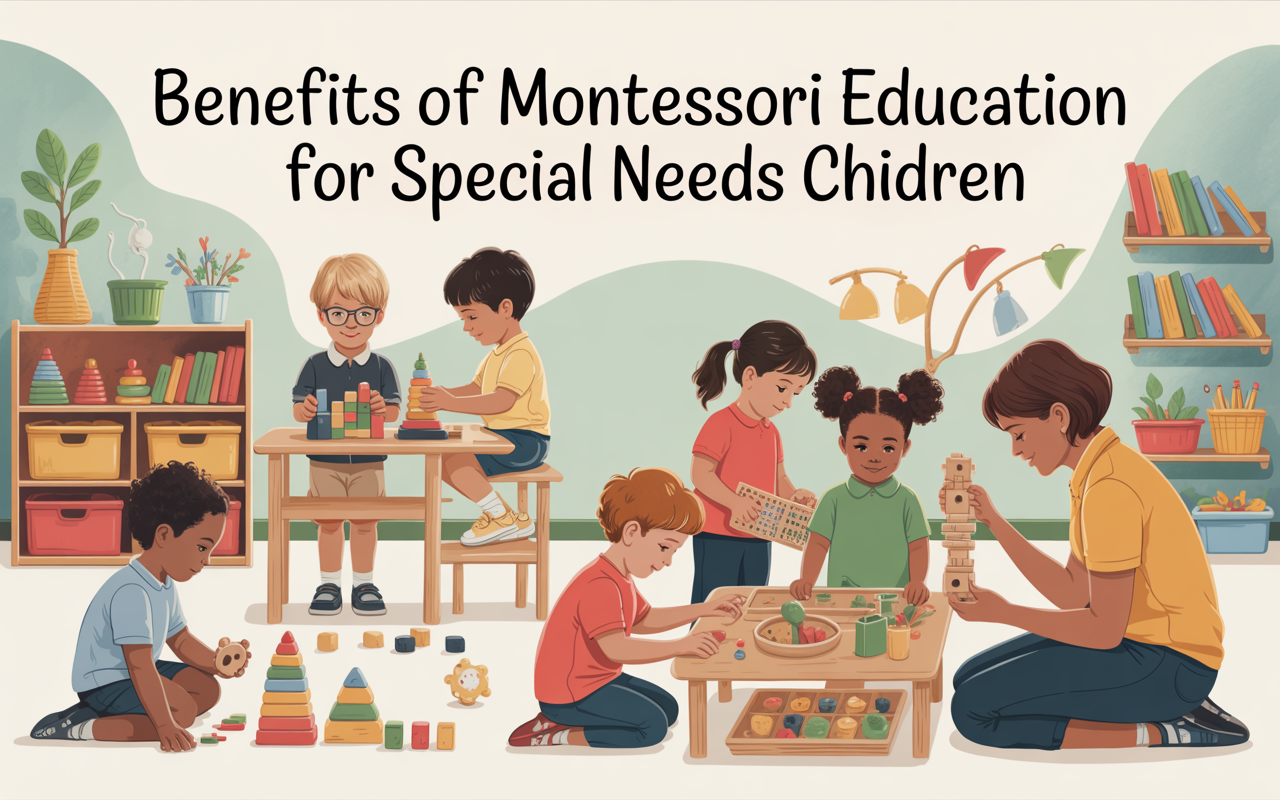Benefits of Montessori Education for Special Needs Children




Every child learns at their own pace. For children with special needs, finding the right learning environment can make a big difference in how they grow, learn, and feel confident.
Montessori education, known for its child-centered approach, is especially helpful for children with special needs like ADHD, autism, or developmental delays.

Montessori is a teaching method developed by Dr. Maria Montessori. It focuses on hands-on learning, freedom within limits, and respecting each child’s individuality.
Instead of a traditional classroom where the teacher leads everything, Montessori classrooms are calm, structured spaces where children learn by doing.
Montessori classrooms allow children to move at their own pace. This means a child who needs extra time isn’t rushed and a child who grasps things quickly can move ahead.
Children with ADHD or autism often benefit from learning by touch and movement. Montessori materials are designed to engage the senses, helping children stay focused and understand concepts better.
The Montessori environment is calm and predictable, which helps children with autism feel secure. They know what to expect each day, reducing anxiety and stress.
From buttoning shirts to preparing snacks, Montessori teaches children real-life skills. This builds confidence and independence, especially valuable for children with learning challenges.
One of the strongest values in Montessori education is respect. Children are not compared to others. This builds a sense of self-worth and belonging, which is crucial for kids who often feel left out.
Children with ADHD (Attention-Deficit/Hyperactivity Disorder) often struggle in traditional classrooms due to constant rules, noise, or sitting still for too long. In Montessori classrooms:
Children with autism may face sensory challenges or social difficulties. Montessori helps by:
Montessori blends beautifully with special education strategies:
This method doesn’t label or limit. Instead, it supports every child to do their best.
Because it focuses on:
A Montessori preschool education is different from regular classrooms. It’s a calm and friendly space where kids learn by doing things on their own. This method is over 100 years old and is still trusted by parents around the world today.
More families in India and across the globe are choosing Montessori for their children’s early learning. Why? Because it helps children grow into confident, curious, and independent learners right from the start.
Want to know how it really helps?
Check out the Top 10 Benefits of a Montessori Preschool Education to see why it could be the best choice for your child.
Whether you're a parent, a student, or someone dreaming of becoming a teacher, you’ve probably heard of Montessori Certification and Teacher Training Certificate. At first, they might seem the same—but they actually prepare you for different ways of teaching.
Not sure which one is right for you? Don’t worry! We’ve explained it clearly in our blog Montessori Certification vs Teacher Training Certificate: What’s the Difference? so you can choose the path that fits your goals best.
If you’re passionate about helping children with special needs, the Montessori Early Childhood Care and Education (ECPC) course by Interval Learning is a great place to start.
You’ll learn how to:
Start your Montessori teaching journey with Interval Learning’s ECPC course today. Make a difference where it matters most.
Contact us today!
Yes, Montessori offers freedom of movement, hands-on learning, and a calm environment, perfect for children with ADHD.
Absolutely. Montessori supports children with autism by offering routine, sensory-friendly materials, and gentle guidance at their own pace.
Montessori doesn’t label children. It focuses on strengths, independence, and learning through doing, which boosts confidence and motivation.
Yes, good Montessori teacher training programs (like Interval Learning’s ECPC course) include strategies to support diverse learners, including those with special needs.